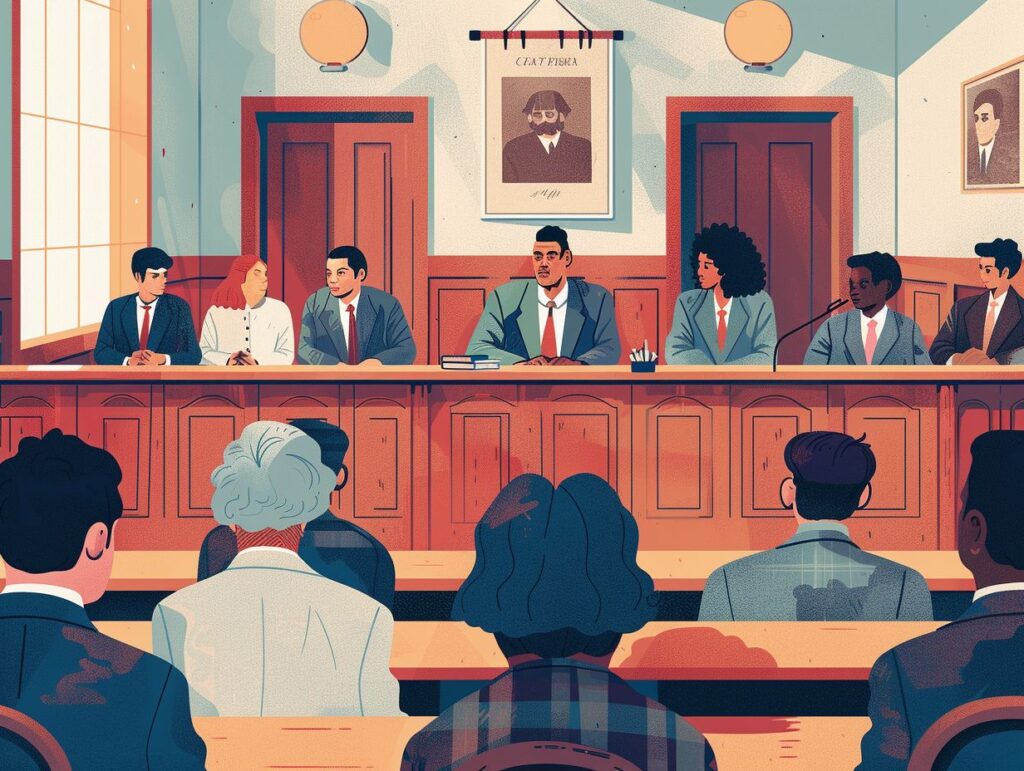Intellectual property disputes can be complex and challenging to navigate, especially when they escalate to the court system.
In Florida, these disputes can arise in various forms, including copyright, patent, trademark, and trade secret disputes. Understanding how to handle IP disputes in Florida courts is crucial for protecting your rights and interests.
From determining jurisdiction to gathering evidence and considering alternative dispute resolution options, there are important steps to follow.
This article will also explore possible outcomes of IP disputes in Florida courts, such as injunctions, damages, and licensing agreements.
We will provide valuable tips for avoiding IP disputes altogether, including conducting thorough research, keeping accurate records, using contracts and agreements, and seeking guidance from an IP attorney.
Stay tuned to learn more about navigating the complex world of IP disputes in Florida courts.
Key Takeaways:

- Be aware of the different types of IP disputes in Florida, such as copyright, patent, trademark, and trade secret disputes.
- When handling IP disputes in Florida courts, it is important to determine jurisdiction, gather evidence, consider ADR, and potentially file a lawsuit.
- Possible outcomes of IP disputes in Florida courts include injunctions, damages, and licensing agreements. To avoid disputes, conduct research, keep records, use contracts, and consult an IP attorney.
How to Handle IP Disputes in Florida Courts?

Dealing with IP disputes in Florida courts necessitates a comprehensive grasp of the state’s legal structure and the particular procedures related to intellectual property litigation. Florida businesses need to navigate both federal and state laws in order to handle IP disputes efficiently.
1. Determine the Jurisdiction
Determining the appropriate jurisdiction is a critical first step in handling IP disputes, as it affects the application of federal and state laws in Florida.
When choosing the court for filing an IP lawsuit in Florida, it is essential to understand the distinctions between federal and state laws. Federal courts have exclusive jurisdiction over certain types of intellectual property disputes, such as patent and copyright infringement cases.
State courts, on the other hand, can handle a broader range of IP matters, including trade secret misappropriation and unfair competition claims. Understanding the nuances between these legal systems can help parties navigate the complexities of IP litigation effectively.
2. Gather Evidence
In IP disputes in Florida, it is crucial to gather enough evidence to support claims of unauthorized use and safeguard intellectual property rights.
Documentation serves a vital role in establishing a trail of evidence, which can include copyright registrations, contracts, and communication records. Expert testimony can enhance the credibility of intricate technical aspects of the case, and forensic analysis can reveal digital traces of infringement.
When presenting evidence in Florida courts, it is important to verify that all documentation is appropriately authenticated and relevant. Working with knowledgeable intellectual property attorneys can assist in navigating the complexities of IP disputes and effectively presenting evidence to strengthen your case.
3. Consider Alternative Dispute Resolution (ADR)
Alternative Dispute Resolution (ADR) methods, such as mediation and arbitration, can provide efficient ways to resolve IP disputes in Florida without resorting to lengthy court battles.
Mediation, for example, entails a neutral third party aiding the disputing parties in reaching a voluntary agreement. It fosters open communication and collaboration, enabling the parties to discover mutually beneficial solutions.
On the other hand, arbitration entails a neutral arbitrator who renders a binding decision after considering arguments and evidence from both sides. The choice between the two methods depends on factors such as the case’s complexity, the desired level of control over the outcome, and the parties’ willingness to cooperate.
Legal advice can offer valuable guidance in determining the most appropriate ADR method for your specific IP dispute.
4. File a Lawsuit
Initiating a legal action is a formal approach to handling intellectual property disputes, involving specific procedures and adherence to Florida’s legal protocols for intellectual property litigation.
Navigating the legal terrain of intellectual property conflicts in Florida can be intricate, emphasizing the pivotal role of legal representation in this context. When contemplating the initiation of a lawsuit for intellectual property matters, it is crucial to seek advice from experienced lawyers who have a strong understanding of intellectual property law.
Legal counsel can aid in collecting evidence, formulating the complaint, and ensuring compliance with all requisite legal standards. Their proficiency can assist you in efficiently navigating the litigation process and improving the likelihood of a favorable resolution to your intellectual property dispute.
Possible Outcomes of IP Disputes in Florida Courts
The potential outcomes of IP disputes in Florida courts can differ, such as injunctions, damages, and licensing agreements, each serving as a legal remedy to resolve the infringement of intellectual property rights.
1. Injunctions
Injunctions are legal tools that courts utilize to compel or prevent certain actions. In Florida, they offer immediate relief in intellectual property disputes through methods like preliminary injunction motions.
These court orders are crucial for intellectual property rights holders seeking to safeguard their IP from infringement or misuse. A preliminary injunction can be granted to maintain the status quo during legal proceedings, serving to prevent further harm until a final decision is made.
Conversely, a permanent injunction may be issued post-trial, barring the defendant from continuing activities that infringe upon the intellectual property. To secure an injunction, the party requesting relief must show a probability of success on the merits, irreparable harm if the injunction is not granted, and that the balance of equities favors the issuance of the injunction.
2. Damages

Damages are a form of financial compensation provided to the injured party in IP disputes, aiming to address the harm resulting from the violation of intellectual property rights in Florida.
These damages can come in different types, such as compensatory damages and punitive damages. Compensatory damages seek to reimburse the plaintiff for the losses incurred due to the infringement, which may include lost profits or licensing fees.
On the contrary, punitive damages are meant to penalize the infringing party for deliberate wrongdoing or intentional infringement.
Calculating damages in IP disputes involves evaluating the actual damage caused, the profits obtained by the infringer, and other pertinent factors. The significance of damages in resolving IP disputes lies in offering a just resolution that compensates the injured party and discourages future violations.
3. Licensing Agreements
Licensing agreements can serve as a mutually beneficial solution in IP disputes, permitting the infringing party to use the intellectual property lawfully while offering compensation to the rights holder in Florida.
These agreements often detail the specific terms and conditions that govern the infringing party’s use of the intellectual property, including restrictions on usage, duration of the agreement, and financial compensation terms.
By establishing these parameters clearly, licensing agreements help mitigate future disputes and ensure that both parties comprehend their rights and responsibilities. These agreements typically cover aspects such as royalty payments, confidentiality clauses, quality control standards, and mechanisms for resolving disputes, establishing a legal framework for addressing disagreements that may arise during the agreement.
Tips for Avoiding IP Disputes
Preventing IP disputes includes taking proactive steps like performing intellectual property audits, securing copyright registrations, and utilizing non-disclosure and employee agreements to safeguard your assets.
1. Conduct Thorough Research
It is crucial to conduct thorough research, including market research and clearance searches, to identify potential IP conflicts and monitor competitors effectively in order to avoid disputes. Investing time and resources into comprehensive market research provides valuable insights into the competitive landscape, emerging trends, and potential risks related to intellectual property.
Conducting clearance searches helps determine if a specific product or branding is already protected by existing patents or trademarks, thus avoiding infringement issues.
Regularly monitoring competitors enables businesses to stay informed about new market developments and proactively address any potential IP disputes before they escalate. These strategies play a significant role in safeguarding intellectual property rights and maintaining a competitive edge in the market.
2. Keep Accurate Records
It is essential to keep accurate records of intellectual property, including documentation and evidence of ownership, to help in defending against potential IP disputes.
By maintaining detailed records, individuals and organizations can establish a clear trail of ownership and protect their ideas and innovations from infringement. Types of records that should be kept include invention notebooks, copyright registrations, patent filings, licensing agreements, and communication records related to IP discussions.
These documents serve as tangible proof of creation dates, ownership transfers, and licensing terms, which are essential in legal proceedings or negotiations. Robust record-keeping also strengthens the credibility of IP claims and bolsters the chances of successful enforcement actions against infringers.
3. Use Contracts and Agreements
Utilizing contracts and agreements like non-disclosure and employee agreements can assist in safeguarding intellectual property and preventing IP disputes by clearly outlining rights and responsibilities.
By including essential terms and clauses in these agreements, companies can establish specific guidelines concerning the use, disclosure, and ownership of intellectual property. For instance, non-disclosure agreements often specify the extent of confidentiality, duration of the agreement, and consequences of violation.
Conversely, employee agreements commonly feature provisions related to the assignment of inventions, non-compete clauses, and post-employment obligations to uphold confidentiality. These clauses form a crucial framework for protecting valuable intellectual assets and minimizing the potential for disputes and conflicts.
4. Consult an IP Attorney
Seeking legal advice from an IP attorney is crucial to navigate the intricacies of intellectual property law and prevent potential disputes related to IP.
Through consultation with an IP attorney, individuals and businesses can acquire a comprehensive understanding of their intellectual property rights and the most effective methods to protect them. Legal counsel can aid in the creation and submission of patents, trademarks, and copyrights, ensuring the preservation of your intellectual property.
An experienced IP lawyer can also provide assistance in enforcing these rights by pursuing legal action against any infringement. Proactive legal approaches can help anticipate disputes and conserve time and resources in the long term, underscoring the invaluable expertise of an IP attorney.
Frequently Asked Questions

What is an IP dispute and how does it relate to Florida courts?
An IP dispute is a disagreement over intellectual property rights, such as patents, trademarks, or copyrights. These disputes can arise in the state of Florida and may be resolved through legal proceedings in Florida courts.
What are the steps for handling an IP dispute in Florida courts?
The first step is to consult with a lawyer who specializes in intellectual property law in Florida. They can help you understand your rights and options for resolving the dispute. If necessary, the lawyer can then file a lawsuit on your behalf in a Florida court.
What should I consider before filing an IP dispute in a Florida court?
Before filing a lawsuit, make sure you have a strong case and enough evidence to support your claims. Also consider the potential costs and time involved in the legal process. It may be beneficial to try to negotiate a settlement or alternative resolution before going to court.
What types of remedies are available for IP disputes in Florida courts?
If a Florida court finds in your favor, you may be entitled to remedies such as monetary damages, injunctions, or court orders to stop the infringing activity. These remedies are meant to compensate you for any losses and protect your intellectual property rights.
What are some common defenses against IP disputes in Florida courts?
Some common defenses against IP disputes in Florida courts include fair use, lack of evidence of infringement, and expiration of the intellectual property rights. It is important to consult with a lawyer to determine the best defense strategy for your specific case.
Can I handle an IP dispute in a Florida court without a lawyer?
It is possible to handle an IP dispute in a Florida court without a lawyer, but it is not recommended. Intellectual property law can be complex and it is important to have legal expertise on your side to ensure the best possible outcome. A lawyer can also help you navigate the legal process and advocate for your rights.























Rate this article:
Average rating 0 / 5. Vote count: 0
No votes so far! Be the first to rate this post.
No Comments yet!